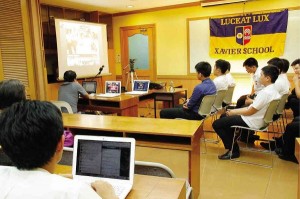“[IN] A WORLD in which issues of religious and cultural identity are increasingly preoccupying governance and politics,” says former United Kingdom prime minister Tony Blair, “it’s now more important than ever that young people and the leaders of tomorrow have an understanding of how religion motivates people—for good and, unfortunately, also for bad.”
Blair, in a talk at the University of Hong Kong recently, cites “the horrific attack on an innocent British soldier on the streets of London… the violent conflict between faith groups in Nigeria… recent events in Bangladesh… the Mindanao dispute in the Philippines.”
With a rapidly increasing young global population, “it is going to take generational change to really tackle extremism—to make accessible the unfamiliar and to make sure minds are kept open,” says Blair.
To promote dialogues among young people, Blair has dedicated his foundation to the cause of peace.
“I want to help ensure we eliminate the seeds of extremism by providing educational opportunities for students around the world and I want to help demonstrate how harnessing the social capital of different cultures and faiths can be a force for progressive social change,” says Blair.
Respect
Founded in 2008, the Tony Blair Faith Foundation runs various programs, including Face to Faith (FTF). Despite the name, FTF is not a religious program. It works with anyone committed to peace, with or without religious affiliations.
Specially designed for those aged 12 to 17, FTF connects students around the world via a secure videoconferencing website to discuss religious and cultural issues safely. A trained adult moderator ensures that RESPECT reigns at all times.
RESPECT is both a principle and an acronym.
Respect—Since our world is diverse, we need to respect each other’s beliefs, values and attitudes.
Education—The aim is not to convince or convert but to promote understanding and overcome prejudice.
Safety—A safe environment allows students to share with honesty and confidence.
Perspective—Small steps and small groups are necessary to reach bigger goals.
Empathy—We grow and learn when we view the world through other people’s eyes.
Celebration—We are all different, which is something to be joyful for.
Trust—Through building relationships with people around the world, we ultimately learn to trust one another.
Xavier School
Active in 19 countries, including Pakistan, Italy, Egypt, the United States and the Philippines, FTF connects more than 30,000 students. In 2011, through the efforts of former Xavier School head Johnny Go, S.J., Blair signed a memorandum with Education Secretary Armin Luistro to launch FTF in the country.
FTF provides free teaching resources on topics like the environment, freedom of expression, poverty and wealth, and compassionate action.
Xavier director Aristotle Dy, S.J., is currently the FTF Philippines country head, with Erwin Montojo as assistant coordinator. FTF now has 22 Filipino school members.
The local FTF tackles such issues as the protracted peace talks between the government and the Moro Islamic Liberation Front.
“The peace process does not seem to engage as many people in the north as those in the south,” says Jeraldine Ching of FTF Philippines. “Not many people [particularly the young] in Luzon and the Visayas understand the nuances of the trouble in the south—the various cultures, religions, traditions, history, demography and geography.”
Eye-opener
I witnessed the first live videoconference in August, linking students of four schools: Ateneo de Zamboanga University (Zamboanga City), Santa Lucia High School (Pasig City), Paco Catholic School (Manila) and Xavier (San Juan City).
Led by a British moderator in London, the students engaged in a two-hour discussion about what made their schools unique, how they used that uniqueness to enrich their communities and how they could harness their faith to help them work with people different from them.
Santa Lucia is a public high school with no formal religion course. But the other schools discovered that its students were as serious about their faith as those in religious institutions.
Xavier students were asked how they reconciled Chinese upbringing with the Catholic faith. A non-Chinese student said the school did not just cater to the Chinese but also to those of other ethnicities. Another student discussed the integration of Catholic beliefs into the Chinese culture, such as ancestor worship.
Equal opportunities for all, regardless of religion, race and social class, which another student mentioned, was enthusiastically received by one of his peers from Paco Catholic School, who said they also endorsed the idea.
The eye-opener was Ateneo de Zamboanga (ADZ). High school girls in hijab, who sat side by side with Catholic classmates, said they felt welcome in a multicultural community. They noted that their aspirations (to make their families proud and to do well in school) were no different from those of others.
The other schools were struck by the fact that ADZ, a Catholic institution, had a place of worship on campus for Muslim students.
For an afternoon, four schools and a hundred students, at least, dialogue and respectful curiosity flourished, harbingers of a more peaceful world.
Incidentally, on Sept. 21, the world will mark the annual World Peace Day.
Schools are invited to join Face to Faith. E-mail FTF Philippines at philippines1@
facetofaithonline.org. Visit tonyblairfoundation.org/ projects/facetofaith.
E-mail the author at blessbook@yahoo.com.
